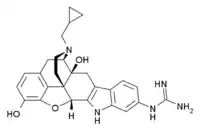6'-Guanidinonaltrindole
6'-Guanidinonaltrindole (6'-GNTI) is a κ−δ-opioid receptor selective ligand used in scientific research.[1]
 | |
| Names | |
|---|---|
| IUPAC name
2-[(1S,2S,13R,21R)-22-(cyclopropylmethyl)-2,16-dihydroxy-14-oxa-11,22-diazaheptacyclo[13.9.1.01,13.02,21.04,12.05,10.019,25]pentacosa-4(12),5(10),6,8,15,17,19(25)-heptaen-8-yl]guanidine | |
| Identifiers | |
3D model (JSmol) |
|
| ChEMBL | |
| ChemSpider | |
PubChem CID |
|
| |
| |
| Properties | |
| C27H29N5O3 | |
| Molar mass | 471.561 g·mol−1 |
Except where otherwise noted, data are given for materials in their standard state (at 25 °C [77 °F], 100 kPa). | |
| Infobox references | |
With 6'-GNTI, evidence was provided for the first time that receptor oligomerization plays functional role in living organisms.[2]
6'-GNTI is an extremely biased agonist of the κ-opioid receptor.[3] It is a potent partial agonist of the G protein pathway but does not recruit the β-arrestin pathway.[3] Due to its functional selectivity for the G protein pathway, 6'-GNTI functions as an antagonist of nonbiased KOR agonists on the β-arrestin pathway.[3] It is thought that 6'-GTNI may be able to produce analgesia without dysphoria and with a lower incidence of tolerance.[3]
References
- Rives, ML; Rossillo, M; Liu-Chen, LY; Javitch, JA (2012). "6'-Guanidinonaltrindole (6'-GNTI) is a G protein-biased κ-opioid receptor agonist that inhibits arrestin recruitment". J Biol Chem. 287 (32): 27050–4. doi:10.1074/jbc.C112.387332. PMC 3411045. PMID 22736766.
- Waldhoer M, Fong J, Jones RM, Lunzer MM, Sharma SK, Kostenis E, Portoghese PS, Whistler JL (June 2005). "A heterodimer-selective agonist shows in vivo relevance of G protein-coupled receptor dimers". Proc. Natl. Acad. Sci. U.S.A. 102 (25): 9050–5. doi:10.1073/pnas.0501112102. PMC 1157030. PMID 15932946.
- Rives, M.-L.; Rossillo, M.; Liu-Chen, L.-Y.; Javitch, J. A. (2012). "6'-Guanidinonaltrindole (6'-GNTI) Is a G Protein-biased -Opioid Receptor Agonist That Inhibits Arrestin Recruitment". Journal of Biological Chemistry. 287 (32): 27050–27054. doi:10.1074/jbc.C112.387332. ISSN 0021-9258. PMC 3411045. PMID 22736766.
This article is issued from Wikipedia. The text is licensed under Creative Commons - Attribution - Sharealike. Additional terms may apply for the media files.